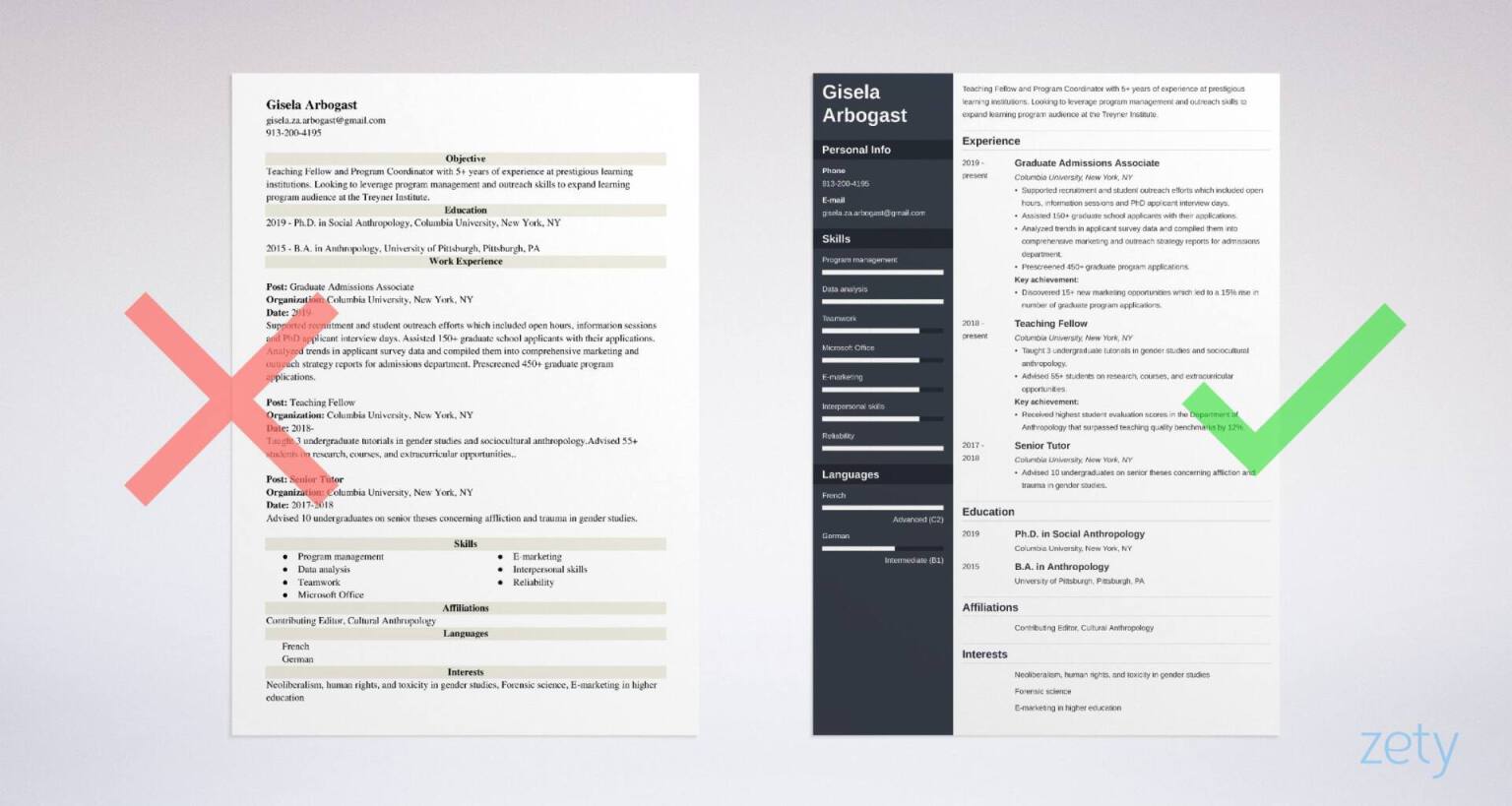PhD Resume Example for Industry & Non-Academic Jobs
Create Your Resume NowWriting a dissertation is tough—but breaking into industry can feel even tougher. Crafting a PhD resume for industry means unlearning the academic instinct to include everything. In this world, less truly is more. You’ve got just seconds to grab attention.
So how do you trim the fat without cutting your value? How do you compete with candidates already fluent in the rules of the game? Don’t worry—we’ve broken it all down into a clear roadmap to help you shift from “overlooked” to “interviewed” faster than you can find a decent parking spot on campus.
Want to save time and have your resume ready in 5 minutes? Try our resume builder. It’s fast and easy to use. Plus, you’ll get ready-made content to add with one click. See 20+ resume templates and create your resume here.
Sample resume made with our builder—See more resume samples here.
Explore more of our resources tailored specifically for academics making the leap into industry:
- Professor CV
- Professor Resume
- Academic CV
- Graduate School Resume
- Undergraduate Resume
- Research Assistant Resume
- Environmental Science Resume
- Teaching Assistant Resume
- Bioinformatics Resume
- Resume Samples for All Professions
Not sure how a CV differs from a resume? Check out: CV vs Resume. What’s the difference?
PhD Industry Resume Example
Gisela Arbogast
gisela.za.arbogast@gmail.com
913-200-4195
Objective
Teaching Fellow and Program Coordinator with 5+ years of experience at prestigious learning institutions. Looking to leverage program management and outreach skills to expand learning program audience at the Treyner Institute.
Work Experience
Graduate Admissions Associate
Columbia University, New York, NY
2019-
- Supported recruitment and student outreach efforts which included open hours, information sessions and PhD applicant interview days.
- Assisted 150+ graduate school applicants with their applications.
- Analyzed trends in applicant survey data and compiled them into comprehensive marketing and outreach strategy reports for admissions department.
- Prescreened 450+ graduate program applications.
Key achievement:
- Discovered 15+ new marketing opportunities which led to a 15% rise in number of graduate program applications.
Teaching Fellow
Columbia University, New York, NY
2018-
- Taught 3 undergraduate tutorials in gender studies and sociocultural anthropology.
- Advised 55+ students on research, courses, and extracurricular opportunities.
Key achievement:
- Received highest student evaluation scores in the Department of Anthropology that surpassed teaching quality benchmarks by 12%.
Senior Tutor
Columbia University, New York, NY
2017-2018
- Advised 10 undergraduates on senior theses concerning affliction and trauma in gender studies.
Education
Ph.D. in Social Anthropology
Columbia University, New York, NY
2019
B.A. in Anthropology
University of Pittsburgh, Pittsburgh, PA
2015
Skills
- Program management
- Data analysis
- Teamwork
- Microsoft Office
- E-marketing
- Interpersonal skills
- Reliability
Affiliations
Contributing Editor, Cultural Anthropology
Languages
- French—Advanced (C2)
- German—Intermediate (B1)
Interests
Neoliberalism, human rights, and toxicity in gender studies
Forensic science
E-marketing in higher education
Here’s how to write a PhD resume that grabs attention with clarity, confidence, and purpose:
1. Pick the Best Format for Your PhD Resume
A PhD resume is your go-to option when applying for roles outside academia or research. It shifts the focus from academic achievements to practical skills and professional experience—key for roles where a PhD isn’t a core requirement and academic contributions may go unrecognized.
Unlike the academic world, the private sector values speed and results. Long explanations won’t fly. You need to reframe your background to align with industry expectations.
Intrigue the hiring manager using the following resume formatting guidelines:
- Get your resume contact information right from the beginning. Don’t forget to check your social media footprint and optimize your LinkedIn profile with relevant experience and skills.
- Out of all resume styles, the best format for doctors is the chronological layout. This is the layout that puts your professional experience at the forefront and one that most hiring managers recognize. It’s also a super ATS-friendly resume format.
- Use a resume font that is legible and modern. Don’t forget to leave plenty of white space on the page to make your text really stand out.
- Save your PhD resume in PDF to make sure that your resume layout doesn’t open up a mess.
At this point you might also be wondering how long your resume should be. If you have a few years of experience outside of academia, go for two pages. Otherwise, one-page resume template should do the trick.
2. Write a PhD Resume Objective or Resume Summary
Introduce yourself through your resume profile, or more specifically, a resume objective or summary. It’s a short and sweet paragraph at the top of your PhD industry resume that explains why you’re the person for the job. Think of it as an attention-grabbing thesis title.
Use a career summary if you've got a few years of experience that translates well to the private sector.
- Start by listing your top experience, skills, and accomplishments.
- Then choose 3-4 top selling points and add those into your PhD resume summary section.
IIf your recent focus has been on academics, opt for the career objective:
- Underline the knowledge and relevant skills (hard skills or soft skills) you’ve gathered to date and how well you’d fit in.
- Include transferable abilities and measurable results from any previous work or academic projects to strengthen your case.
There’s no need to drown this section in a ton of information. Keep it 3-4 sentences long max and tailor it to the job description of the position you’re applying for.
Use resume keywords to pass the ATS scan. Check:What are Resume Keywords?
3. Write the Perfect PhD Resume Job Description
You know what your greatest challenge is now? Your resume experience section needs to show your pragmatic side. You see, the hiring manager realizes that you know your stuff. Show the hiring manager that you can get things done:
- List your most recent position first, then work backward through your previous roles.
- Each job entry should include: job titles, company name, dates of employment, and no more than 6 bullet points.
- Limit the number of bullet points as you go back in time with your experience. Have up to 3 for positions far in the past.
- Start each bullet point with an action verb.
- Highlight quantifiable achievements rather than listing generic duties.
- Tailor your experience to align with the specific job you're applying for.
Remember, this isn’t the place for academic over-explanation—keep it concise and focused on results.
Pro Tip: Don’t come up with roles or responsibilities that you never had just to make yourself look more appealing. Recruiters do background checks and will verify whether you’re telling the truth through tests and interviews.
4. Make Your PhD Education Section Shine
Your education is key, but in the private sector, less is more. Highlight what matters most and leave out the long academic details. Here’s how to refine it:
- If you have several years of job experience opt for only listing the following: college/university name and location, years you studied, degree, major and minors.
- Have little experience? Enrich your education resume section with achievements from your academia days. Make sure to keep them relevant to the job description and list no more than 4-6 items.
Once again, focus on clarity, not excess. You may be tempted to list all your certifications on your resume, but leave it for a separate section to keep things clear and easy to read.
Studied abroad? Check how to put it on your PhD resume: Studying Abroad on a Resume
5. Showcase Your PhD Skills
This is your chance to highlight the skills you’ve developed—something academia doesn't often ask you to do:
- Create a list of all the job skills you have— this means soft skills and hard skills, technical skills, and any other relevant skills you’ve got on your bookshelf.
- Select the PhD skills most relevant to the job by referencing the job ad. Incorporate these into your resume for industry roles. You'll stand out even more if you can back up those skills with examples from your education and work experience.
PhD Resume Skills
- Ethics & Integrity
- Microsoft Office skills
- Interpersonal skills
- Writing
- Organizational skills
- Problem-solving
- Time management
- Communication skills
- Critical thinking
- Analytical thinking
We analyzed 11 million resumes created in our builder, and here are the top 10 most frequently added skills to resumes by our users:
- Teamwork and Collaboration
- Problem-solving
- Excellent Communication
- Multitasking
- Attention to Detail
- MS Office
- Analytical and Critical Thinking
- Data Entry
- Project Management
- Team Management
Making a resume with our builder is incredibly simple. Follow our step-by-step guide, use ready-made content tailored to your job and have a resume ready in minutes.
When you’re done, our resume builder will score your resume and our resume checker will tell you exactly how to make it better.
6. Enhance Your PhD Resume With Additional Sections
Having a PhD doesn’t automatically guarantee success in the job market. In fact, it can sometimes make finding a job even trickier. Adding extra sections to your PhD resume gives you an opportunity to showcase unique qualities that set you apart from other candidates. Here's how to stand out:
- Include language skills. As an academic, you likely have strong language abilities, which can give you an advantage, especially in roles requiring clear communication or cross-cultural understanding.
- Add volunteering,achievements and awards, and projects that are relevant. This shows that you're active outside of academia and can bring additional experience and skills to the table.
- List publications if you have any that could be relevant to the role. Published works can demonstrate your expertise and position you as a thought leader in your field.
- Add hobbies and interests if they’re relevant. While they may seem secondary, they can highlight transferable skills or unique knowledge that could be valuable in the private sector.
7. Craft a PhD Cover Letter
If you’re wondering if you should include a cover letter with your PhD resume, the answear is clear—yes, you should.
Here’s how to craft the perfect PhD cover letter that stands out:
- Choose a sleek, modern cover letter format.
- Use a hook to start your cover letter right.
- Highlight your experience and relevant job skills.
- Use a strong call to action to end your cover letter.
Remember, keep it concise—no need for fluff. The ideal length for a cover letter is one page. Anything longer? It's just unnecessary.
Read more:How to Write a Cover Letter
Plus, a great cover letter that matches your resume will give you an advantage over other candidates. You can write it in our cover letter builder here. Here's what it may look like:
See more cover letter templates and start writing.
And once you'e sent everything off, remember to follow up on your job application! Just like in academia, things don’t always happen right away in the private sector either. Persistence goes a long way.
That’s the recipe for a successful PhD resume, simplified.
Thanks for reading! Have any insider tips or tricks to share about crafting the perfect PhD resume? Drop them in the comments below!
About Zety’s Editorial Process
This article has been reviewed by our editorial team to make sure it follows Zety's editorial guidelines. We’re committed to sharing our expertise and giving you trustworthy career advice tailored to your needs. High-quality content is what brings over 40 million readers to our site every year. But we don't stop there. Our team conducts original research to understand the job market better, and we pride ourselves on being quoted by top universities and prime media outlets from around the world.



